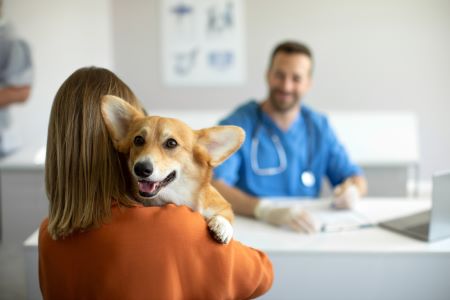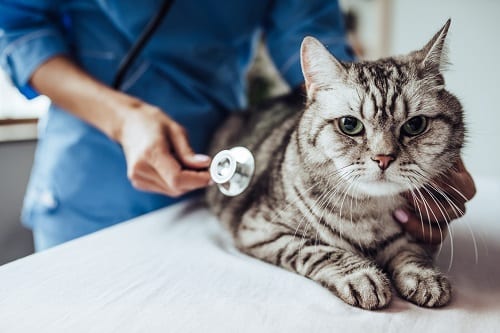Spaying and neutering of dogs and cats has multiple advantages, not just because it helps to keep the population down and relieve the crowding in animal shelters.
It also prevents the development of pyometra, which is a uterine infection common in older, unspayed female dogs and cats. It’s a particularly serious condition in dogs, and if it doesn’t get timely treatment it can result in a secondary infection and ultimately the death of your dog.
Although cats also get pyometra, it doesn’t have the same severe effects and cats generally recover faster.
What Causes of Pyometra in Dogs and Cats?
The Latin word “pyo” means pus and “metra” is the uterus, so pyometra is essentially an infected uterus. It’s caused by the growth of E.coli bacteria in the lining of the uterus over time, which originally travel up from the animal’s vulva when it is open during heat. If a female dog has received estrogen injections to prevent an accidental pregnancy, this increases the risk of developing pyometra significantly.
Types of Pyometra Infection
Dogs and cats can get one of two different types of pyometra infection. The first is an open pyometra, which means the cervix stays open and the infection is able to drain out. In a closed pyometra, however, the contents of the uterus aren’t able to escape and they can become toxic. A closed pyometra in cats and dogs is harder to diagnose and generally makes the animal more severely ill than an open one.
Signs of Pyometra in Pets
Symptoms of pyometra include early warning signs of the animal feeling unwell, such as vomiting, refusal to eat, lethargy, increased thirst and frequent urination. She may also appear to be uncomfortable, because pyometra is a particularly painful condition for dogs, while being somewhat less so for cats.
If your dog or cat has an open pyometra there may be a foul-smelling, white- or green-colored discharge coming from her vagina, which is the infected pus draining out. If she shows symptoms of a bloated or swollen abdomen without a discharge, she could have a closed pyometra infection. By the time you see any of these external signs, however, the condition is in a fairly advanced stage, so you’ll need to get medical attention right away.
What the Vet Will Do
The first thing your vet will do if he or she suspects pyometra is to examine your pet’s belly. An ultrasound is a useful, non-invasive method of checking whether a swollen abdomen is caused by infection and not by pregnancy. Your vet will take a sample of the discharge for testing, to determine what type of bacteria is causing the infection. Depending on how ill the pet is, she might need to stay overnight in the hospital for treatment.
Treating Pyometra with Surgery
The most common treatment for all pyometra, and the only option for a closed infection, is surgery to remove the dog or cat’s uterus. This is a difficult, high-risk operation because if the infection spills during removal it can be dangerous for the patient. The pet also needs antibiotics to kill any bacteria that might escape the surgery, and because it is a complex procedure, she will need to be hospitalized for a day or two afterwards.
Alternative Treatment Option
An alternative treatment option for open pyometra in dogs or cats is a course of prostaglandin injections. This is only possible if the illness is caught in the early stages, and is not recommended unless your pet is a valuable breeding animal. This form of treatment takes about a week and requires full hospitalization and careful observation during the process. If you’re planning to breed your pet, it’s vital to do so in the heat cycle immediately following the infection, or her chances of becoming re-infected can be as much as 77%.
Outlook for Pets with Pyometra
The outlook for your pet after surgical removal of a pyometra is usually full recovery with no chance for the infection to recur. In dogs treated with prostaglandins, however, the pyometra can cause long-term damage to the uterus. Only 50% to 65% of pregnancies after infection are successful, so veterinarians only attempt this treatment in exceptional circumstances. Cats with open pyometra respond better to prostaglandin treatment and can go on to be as fertile as before.
The defining factor in keeping your pet as healthy as possible is to keep a careful eye out for any unusual changes in behavior. If your pet shows lack of appetite or energy, it could be an indication of anything from colitis to pyometra. Any time your dog or cat seems to be feeling unwell, it’s always best to get her examined as soon as you can. That way any medical conditions can be treated early, which greatly increases the chances of a favorable outcome and lessens the impact on your emotions—and your wallet!




